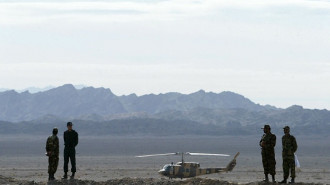Lebanon moves to legalise medical marijuana, but Hezbollah says 'no, haram'
Hezbollah representatives voiced their objection to the law as it was being discussed by the parliament's joint committee, Arabi21 reported. The group follows Shia Islam teachings, which prohibit the use of the drug.
Hezbollah has been accused of cultivation hashish in the Bekaa region, but the party has denied the accusations.
Deputy Speaker of Parliament Elie Ferzli said that both national and international expertise had been consulted by the joint committee before the decision was made.
The deputy speaker also pointed to the McKinsey report, which puts forward the legalisation of cannabis cultivation and export as a boost to the Lebanese economy.
The American consulting firm McKinsey was hired by Lebanon last year to help formulate a plan to reform various sectors, including agriculture.
|
Considered the third most indebted country in the world based on debt-to-GDP ratio, Lebanon has been seeking to reduce its reliance on revenues from remittances and tourism, both of which have come under stress due to geopolitical uncertainties in the tumultuous region.
Lebanon's minister for the economy at the time, Raed Khoury, claimed that cannabis could become a one-billion-dollar industry in the country.
The quasi-lawless area - one of the poorest in Lebanon - is notorious for its production of narcotics, which expanded massively over recent decades, turning into a multi-million-dollar industry.
Lebanon is the world's fourth-largest producer of cannabis, according to a 2017 report by the United Nations Office on Drugs and Crime (UNODC), after Morocco, Mexico, and Paraguay.
But experts say the politically sensitive step of legalising cannabis - even for bespoke exports - is easier said than done.
Agencies contributed to this report.
Follow us on Facebook, Twitter and Instagram to stay connected

![Palestinians mourned the victims of an Israeli strike on Deir al-Balah [Getty]](/sites/default/files/styles/image_684x385/public/2024-11/GettyImages-2182362043.jpg?h=199d8c1f&itok=xSHZFbmc)


![The law could be enforced against teachers without prior notice [Getty]](/sites/default/files/styles/image_684x385/public/2178740715.jpeg?h=a5f2f23a&itok=hnqrCS4x)
 Follow the Middle East's top stories in English at The New Arab on Google News
Follow the Middle East's top stories in English at The New Arab on Google News
![Fakhrizadeh [AFP] Fakhrizadeh [AFP]](/sites/default/files/styles/image_330x185/public/media/images/774C39F7-8F7A-4D67-B998-27D102FCB4A7.png?h=d1cb525d&itok=j9eGvunV)

